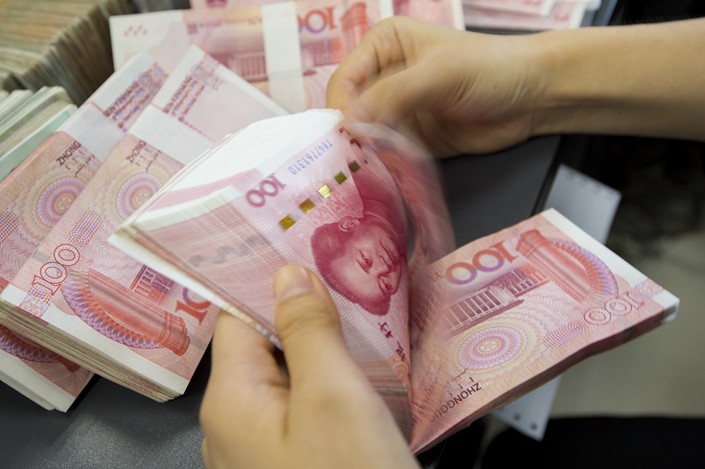Opinion: Refinancing Loans Should Provide Relief, Not Blood Transfusions

*The government is hoping to use a policy which makes it easier for small companies to renew their loans to mitigate the effects of a liquidity squeeze
*Vigilance is needed to ensure that this policy doesn’t prop up “zombie companies" or allow banks to hide their levels of nonperforming loans
(Beijing) — China’s policymakers have stepped up calls for banks to serve the real economy and provide loans for small companies, aiming to ensure that financing the corporate sector doesn’t become a bottleneck that obstructs growth.
Their concern is understandable, especially as the ongoing deleveraging campaign, part of a broader policy to contain financial risks, has led to a liquidity squeeze that’s making it harder for many businesses to get loans. The surge in corporate bond defaults this year has also set investors on edge.
A policy (link in Chinese) introduced in 2014 by the China Banking Regulatory Commission (CBRC) — since merged into the China Banking and Insurance Regulatory Commission — is one way authorities have been trying to help. It allows small and family-owned businesses facing temporary funding problems to renew working capital loans without first repaying the original loan.
That marks a departure from the traditional way companies are allowed to roll over their borrowings. In China, a company can usually only apply for a new loan after repaying its old debt. That means it often has to turn to other sources, such as microlending firms and peer-to-peer lending platforms, to get a bridging loan to tide it over, and such loans usually carry higher interest rates. Even after paying back the original debt, a company needs to wait, sometimes as long as several months, for the bank to decide whether to issue a new loan.
The regulator’s refinancing option can thus save time and money for businesses.
Higher risk
To encourage banks to use the policy, the CBRC made changes to the way these refinancing loans were classified. Under regulations in effect at the time, banks were forced to reclassify any loan extension, a new loan replacing an original loan, or even changes to the repayment terms and interest rates on a loan, as a “special mention” loan.
This change in category meant banks needed to make bigger provisions against the debt due to a theoretically higher risk of it becoming a nonperforming loan. This not only had a negative impact on a bank’s balance sheet but also on the borrower’s credit record.
The new policy allowed banks to classify these refinancing loans as normal loans, with no impact on provisions or a company's credit record.
The Chinese leadership sent out a clear signal last week that it wants to promote the use of refinancing loans, using the country’s most-watched news bulletin to plug the policy. China Central Television, the state broadcaster, put the policy as the top item on its flagship evening news program (link in Chinese) on Friday.
It highlighted the case of a spicy-sauce manufacturer, CSF Co. Ltd., a privately owned company in the eastern province of Shandong, which refinanced its loan under the policy, saving 5 million yuan ($731,000) in financing costs that it would have incurred through other refinancing methods. The program reported it as a positive case of the financial sector providing liquidity support to the real economy.
However, by giving such broad publicity to the policy, there’s a danger it could increasingly be exploited by “zombie companies” — heavily indebted businesses that are kept alive through continuous infusions of cash — to stay afloat. Some provinces, such as the northeastern province of Heilongjiang, have already applied the policy to state-owned enterprises (SOEs). While not all SOEs are basket cases, some have become zombie companies that need to be allowed to fail. There is also a risk that banks will abuse the policy to hide their bad loans.
There is now an urgent need for regulators to clearly specify which companies should be allowed to use the refinancing policy, and to intensify their efforts to prevent banks from understating the true level of their nonperforming loans.
The refinancing policy has an important role to play in supporting the real economy, but regulators need to ensure that it does not become a blood-transfusion service to keep zombie companies alive.
Contact reporter Lin Jinbing (jinbinglin@caixin.com)
- 1Cover Story: China Carves Out a Narrow Path for Offshore Asset Tokenization
- 2Drownings Shake Chinese Enthusiasm for Travel to Russia
- 3China Business Uncovered Podcast: A $15 Billion Bitcoin Seizure and the Fall of a Cybercrime Kingpin
- 4Over Half of China’s Provinces Cut Revenue Targets
- 5Li Ka-Shing’s Port Empire Hit by Forced Takeover Amid Panama Legal Dispute
- 1Power To The People: Pintec Serves A Booming Consumer Class
- 2Largest hotel group in Europe accepts UnionPay
- 3UnionPay mobile QuickPass debuts in Hong Kong
- 4UnionPay International launches premium catering privilege U Dining Collection
- 5UnionPay International’s U Plan has covered over 1600 stores overseas






